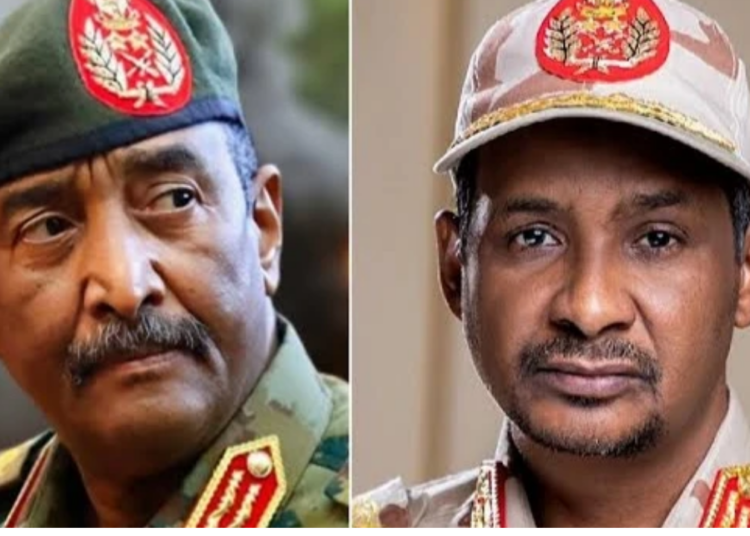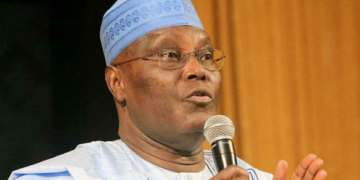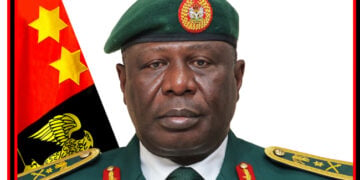As world leaders, the Arab League Council and the United Nation scramble to try and ward off a protracted conflict in Sudan, African leaders, with exception of Egypt whose are already caught up between the two warring factions, have been slow to respond.
This is just as the Sudanese Army has issued a statement that it would help evacuate foreign nationals, including diplomats from UK, US, France and China that are in Khartoum, the country’s capital. As the crisis developed, some diplomats have been attacked putting pressure on world leaders to act.
One day after fight broke out beaten the Sudanese Army and the Rapid Support Force, the Arab League held an emergency meeting last week Sunday at the request of Egypt and Saudi Arabia, in which it called for the immediate halt of all armed clashes in Sudan to avoid further bloodshed and to protect the lives of the Sudanese people as well as Sudan’s sovereignty and territorial integrity.
The African Union also called for an immediate cease-fire by the two parties without conditions” in order to avoid further bloodshed. The Intergovernmental Authority on Development (IGAD) during a virtual meeting Sunday called for an immediate cessation of hostilities. IGAD resolved to send Presidents Salva Kiir of South Sudan, William Ruto of Kenya and Ismail Omar Guelleh of Djibouti at the earliest possible time to reconcile the two parties.
But as the crisis escalated, the AU has been relegated to the background with a lack of coordination and concerns rising that individual countries neighbouring Sudan could take steps that will aggravate the crisis.
Yet, on-going armed conflict has the potential to threaten the peace of neighbouring states including some like Nigeria in West Africa as some 20,000 refugees are already heading towards politically volatile Chad, which for more than two decades has been a source of security concern to Nigeria.
There is also a threat the conflict could even escalate into a regional misunderstanding with the tension between Egypt and Sudan on one hand, and Ethiopia on the other hand over rights to the Nile River.
Sudan shares a border with seven countries, Libya, Egypt, Chad, Central African Republic, Ethiopia and Eritea.
Fighting broke out last Saturday 15 of April in Sudan following disagreements between the Sudanese Army led by Army chief Abdel Fattah al-Burhan and the powerful Rapid Support Force (RSF) led by Mohamad Hamdan “Hemedti” Dagalo.
The Nigerian Government however sees no immediate threat to its security or regional stability. The Defence Headquarters in Abuja said yesterday that it is monitoring situations in the two weeks fighting in Sudan via appropriate security agencies.
The acting director, Defence Information, Brigadier General Tukur Gusau speaking with LEADERSHIP Sunday said though the military high command was not ready to make official statement on the fight, it was monitoring the situation and assured Nigerians of their safety.
“We are monitoring the development through appropriate agencies. For now we cannot make any categorical statement but we are monitoring the development until it becomes clear so that we can take necessary precautions,” he said.
The conflict is over issues of reintegrating the RSF into the formal Sudanese Army and in just seven days of fighting, nearly 1,000 people have been killed in the Sudanese capital Khartoum and other cities as the doctors union said up to 70 percent of hospitals in the capital, Khartoum, and neighbouring states have gone “out of service”.
The beleaguered country was working towards a transition to civilian rule after the military toppled long-serving leader, Omar al-Bashir in April 2019. But the transition to civil rule might have suffered a setback as experts believe that the country has to be saved first from this grim power contest. External forces may have strengthened the hostilities as the warring factions fight for different interests which if not well – managed could destroy the country and threaten neighbouring countries.
A former Director General Nigeria Institute of International Affairs, Professor Jide Osuntokun and other experts have stressed the need to nip the brewing Sudan crisis in the bud, saying its spill over portends grave danger for Nigeria and other Africa countries.
Osuntokun in an exclusive chat with LEADERSHIP Sunday said the negative effects the Libya crisis had on Nigeria may be a child’s play compared with the looming dangers from the Sudan crisis.
He said, ‘’In terms of relationship, Nigeria is vastly more related to Sudan than to Libya. So, whatever is happening in Sudan has repercussions on Nigeria. There are about five million Sudanese who have Nigerian ancestry, they are usually called Felata in Sudan. Felata is a corrupt form of Fulani. These people’s ancestors were going to Sudan either for their pilgrimage or in those days they used to go by foot, by donkey or by horse. If they get to Sudan and they are tired, they stop there and settle there. Some of them will go on to Mecca and Medina and on their way back, when they get tired they stay in Sudan and settle there.
‘’Because in terms of climate and ecology Sudan looks much like Northern Nigeria. In the 1920’s the British and the Egyptians had what we called Anglo Egyptian Constellium of the Sudan, they were jointly ruling the Sudan.
‘’And in that time, they had what we called Gezzilla trained, they were damming the Nile, in order to regain a vast amount of land and plant cotton. So, hundreds and thousands of Nigerians were induced to go to Sudan to join farmers in planting Cotton.
‘’Why I am saying this is that, the “Nigerian” in Sudan have been there for Centuries, they are not new immigrants, so you cannot begin to repatriate them to Nigeria because they will not know which part of Nigeria they came from.
‘’So these people in the Sudan, they are in the army, they are in the Rapid Response squad, they are within the two of them fighting each other in the Sudan. If Sudan were to collapse and people will be running helter skelter, most of them will find their way into Nigeria.
‘’So, it has serious repercussion on Nigeria, even worse than that of Libya.’’
On the move the Nigerian government can forestall the consequences on Nigeria, he said Nigeria can join the international community to ask for peace in Sudan.
‘’As I said we have cultural relations and religious relations with the people of Sudan and we are concerned.
There may be some young Nigerians who are studying in Sudanese university, those are the ones that could be repatriated to Nigeria, and there may be a few thousands. They may be in teacher training or University of Khartoum learning Arabic, these will be young Nigerians who are there for education.
‘’As I said there isn’t much we can do as a country other than to join the international community to ask for peace in Sudan. If countries that are close to the Sudan, like Saudi Arabia, Egypt, Ethiopia cannot assist in pacification of the Sudan we are a little bit farther away than to be able to do anything physically.’’
Also commenting on the Sudan crisis, a scholar of international affairs, Senator Femi Okurounmu said the ongoing war in Sudan is negative reflection on the policy of leadership that is inherent in Africa continent
‘’We are always quarrelling and fighting one another, and the issue we fight over is never the interest of the people, but of who will be in charge of the purse to rob the state the most and turn all the resources of the state to their personal possession.
‘’They are not fighting over any principle or any ideological conflict, they are fighting over personal wealth. They turn the resources of the state to their own personal wants, they begin to fight one another for it. That is a bad reflection of the quality of leadership in Africa.
‘’The problem is not only in Sudan, if you look at African Nations, the quality of African leadership is bad, it is low. The commitment of the leadership to the improvement of the lives of the masses is low; it does not exist.
‘’All that people struggle to get is power, simply for self -enrichment. All they do is to get power, to loot their nation and impoverish the citizens and that is why the country remains poor.
‘’If we have a good government in Nigeria and we have immigration control. They can easily respond to whoever enters the country through the legal and illegal route.’’
Speaking to our correspondent on Saturday, a diplomatic analyst, Mr Charles Onunaiju, who is also the Director of the Center For China Studies in Abuja, tasked the Nigerian government to take proactive steps to forestall the fallout, which could lead to regional instability, warning that Nigeria may not survive another wave of armed insurgency as the country is already overburdened by the Boko Haram and allied violent groups such as the Islamic State In West African Province (ISWAP).
According to Onunaiju, “The capital Khartoum is emptying out with civilians fleeing for their lives I am afraid another Africa war is here with us and with two heavily armed sides engaged in grim battle for power, there are far-reaching consequences for the continent with the conflict not looking good to end very soon,”.He said “People are pouring into Chad and you know that Chad is the gateway to northern Nigeria. So, we might be seeing a rearming of Boko Haram. The implication is another flow of arms from a disintegrating African state again into Nigeria, triggering another insurgency. This is a roadmap to illicit flow of arms into Nigeria just like Libya.
“We might see another terrorist and criminal activities in Nigeria. That is why we say that Nigerian diplomacy will have to evolve and to become proactive and envisage conflict and manage it. We pretended Libya was not our problem, we pretended Chad was not our problem, and now it is Sudan. Nigerian diplomacy should be more proactive and evolve mechanisms for dictating conflicts before they become unmanageable. “
Onunaiju also blamed the armed conflict in Sudan on the poor state system in Africa as well as the interference of Western powers such as the US and Russia, who use countries in the continent as proxies for their interests.
He said “The case of Sudan is the classic case of Africa where the state is still a contested idea. It was really strange to have two parallel armies existing in one country. The Rapid Support Force is a paramilitary, which has independent command alongside the Sudanese Army. So, it was a crisis waiting to happen. The armed groups could not have coexistence over a time without rivalry.
“I understand, in the course of discussions, there were ideas about integrating the paramilitary into the Sudanese formal army but the way they are to be integrated over ranks and roles have become serious issues and I understand some European countries have been funding the paramilitary movement as a way of stopping the illegal migration to Europe.
The Federal Government of Nigeria in a statement issued on Friday by the spokesperson of the Ministry of Foreign Affairs, Francisca Omayuli, expressed deep concern about the escalation of the conflict in Sudan and the attendant suffering to civilians.
“The non-adherence of the warring parties to numerous international calls for a ceasefire has worsened the plight of civilians and made it impossible to embark on their evacuation. Nigeria therefore, wishes to reiterate the urgent need for an immediate ceasefire,” the statement said.
The statement added that the Ministry of Foreign Affairs is in contact with the Sudanese authorities and has, through the Nigerian Embassy in Khartoum, made an official request for permission to evacuate Nigerian students and other members of the Nigerian community who may wish to depart the country.
“Additionally, the Nigerian Embassy has created WhatsApp and Telegram platforms for the students and other Nigerians in Sudan, for the purposes of proper coordination and regular updates. Nigerians in the country are advised to remain indoors and contact the Embassy on any of the following numbers: +249 90 765 0702, +234 803 698 1824, +249 90 132 5359, +249 92 440 1217,” the statement added.
We Are Working To Evacuate Nigerian Citizens From Sudan – NEMA
The National Emergency Management Agency (NEMA), has said it is making arrangements to evacuate stranded Nigerians from Sudan.
This is even as the director-general NEMA, Mustapha Ahmed has assured that NEMA is very much concerned and on top of the situation and is working on all possible options of bringing the stranded Nigerians back home to their loved ones in safe and dignified manner.
The agency also stated that a committee has been set up comprising of professional emergency responders, search and rescue experts to constantly evaluate the situation and seek for the safest way to evacuate the Nigerian citizens even if it is through a country neighbouring country.
A statement by NEMA, head, press unit on Saturday Ezekiel Manzo said the explanation became necessary inorder to inform the public that NEMA is in constant communication with all relevant partners including the Ministry of Foreign Affairs, the Nigerian Embassy in Khartoum, Sudan, the Nigerians in Diaspora Commission and security agencies while seeking an appropriate window of opportunity to evacuate all stranded Nigerians back home in a safe and dignified manner.
He also said that the current emergency situation in Sudan is very complex with fighting between warring factions going on and all airports and land borders closed.
He said: “NEMA is working assiduously with all its partners and is constantly compiling updated information on the situation.





